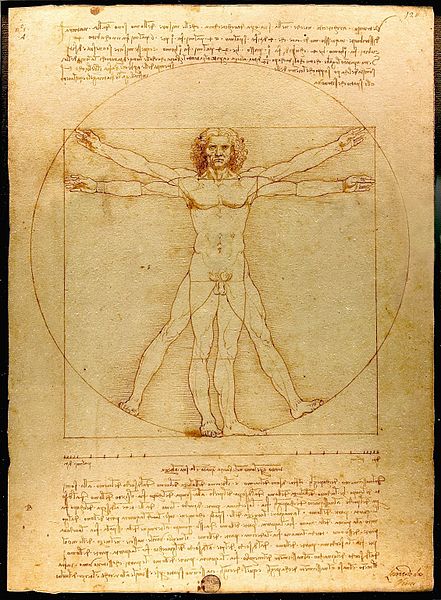 |
Craig White's Literature Courses
humanism or Humanism see also Christian Humanism & Classical Humanism & Judeo-Christianity: Primary Sources / Strands of Western Civilization |
 Leonardo da Vinci, Vitruvian Man c. 1490 (human body = model of proportions for architecture) |
Humanism describes a major cultural and intellectual tradition descending to Western Civilization from the arts and government of Classical Greece and Rome.
For conservative evangelical Americans, "humanism" is usually referred to as "secular humanism," so that humanism becomes a sign of modern godlessness or atheism. Though humanism may emphasize the human realm over the divine, it does not inevitably conflict with religion. During the Middle Ages, for instance, the Catholic Church and Islam preserved classical writings by Aristotle and used them as philosophical foundations for theology. Also many artists and intellectuals of the European Renaissance and Reformation—Michelangelo, Raphael, Martin Luther, Erasmus—combined religious faith with classical learning and techniques to develop Christian Humanism, which continued in the 20th century with Christian thinkers as diverse as civil rights leader Dr. Martin Luther King and Russian novelist Alexander Solzhenitsyn.
![]()
Oxford English Dictionary humanism or Humanism. 3.b. A European intellectual movement or climate of thought from the 14th to the 16th cent., which was characterized in scholarship by attentiveness to classical Latin (and later Greek), . . . by the creative imitation of ancient texts, in education and public life by the promotion of some or all of the wide range of cultural ideals which these texts were supposed to transmit, and in the fine and applied arts by creative response to Roman and Greek artefacts or principles.
5.a. Any system of thought or ideology which places humans, or humanity as a whole, at its centre, esp. one which is predominantly concerned with human interests and welfare, and stresses the inherent value and potential of human life.
b. A variety of ethical theory and practice characterized by a stress on human rationality and capacity for free thought and moral action, and a rejection of theistic religion and the supernatural in favour of secular and naturalistic views of humanity and the universe.
-Ologies & -Isms. Gale Group, 2008: "any system or mode of thought or action in which human interests, values, and dignity are taken to be of primary importance, as in moral judgments"; "a theory of the life of man as a responsible being behaving independently of a revelation or deity." (FreeDictionary.com)
Merriam-Webster: a doctrine, attitude, or way of life centered on human interests or values; esp. a philosophy that usually rejects supernaturalism and stresses an individual's dignity and worth and capacity for self-realization through reason (http://www.merriam-webster.com/dictionary/humanism)
Concise Encyclopedia: Any belief, method, or philosophy that has a central emphasis on the human realm. The term is most commonly applied to the cultural movement in Renaissance Europe characterized by a revival of Classical letters, an individualistic and critical spirit, and a shift of emphasis from religious to secular concerns. This movement dates to the 13th century and the work of the Florentine scholar-statesman Brunetto Latini. Its diffusion was facilitated by the publication of Classical ideas, both in the vernacular and in Latin. (http://www.merriam-webster.com/dictionary/humanism)
![]()
Quotations illustrating humanism:
Classical: "Man is the measure of all things."—Protagoras, presocratic Greek philosopher.
Contemporary: these quotations fit the category of "secular humanism," in which humanism is antagonistic or incommensurable with religion; contrast Christian Humanism.
“Being a Humanist means trying to behave decently without expectation of rewards or punishment after you are dead.”—Kurt Vonnegut
“Human decency is not derived from religion. It precedes it."—Christopher Hitchens
“Faith in God means believing absolutely in something with no proof whatsoever. Faith in humanity means believing absolutely in something with a huge amount of proof to the contrary. We are the true believers.”—Joss Whedon
![]()